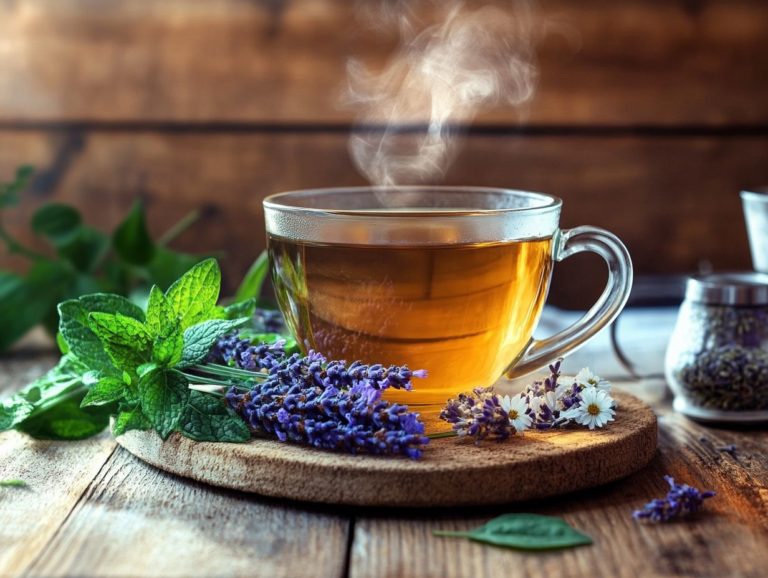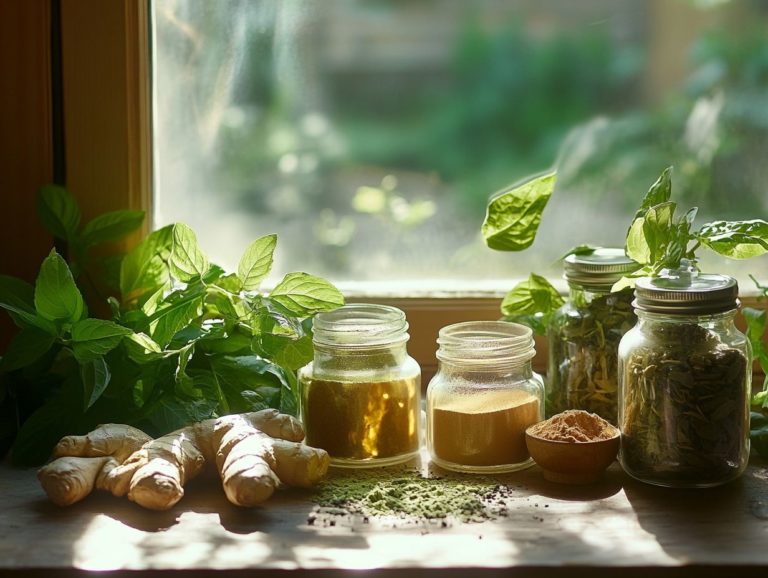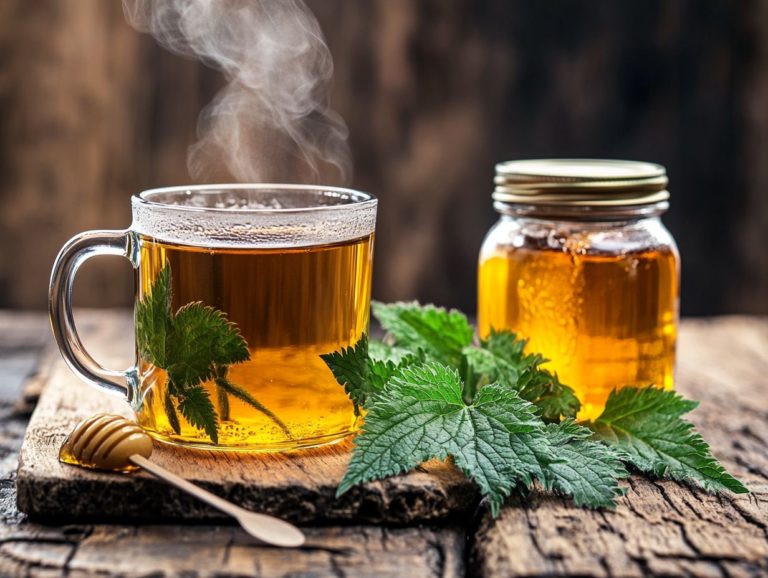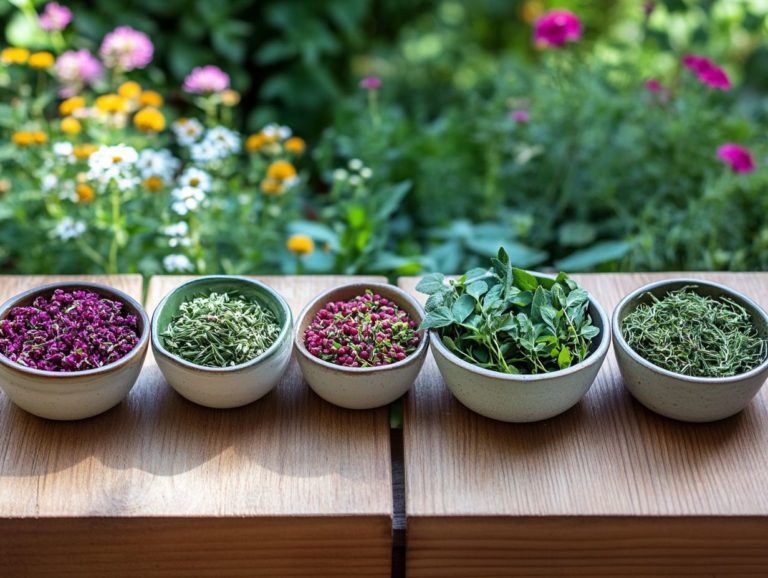5 Must-Try Herbal Remedies for Cold Sores
Cold sores can be quite the nuisance, both uncomfortable and often appearing at the most inconvenient times. While an array of conventional treatments exists, many are now seeking relief from nature s bounty.
This article explores five potent herbal remedies Lemon Balm, Tea Tree Oil, Aloe Vera, Echinacea, and Licorice Root that can effectively soothe and heal cold sores. You’ll learn about their benefits, how to use them properly, potential side effects, and proactive measures to keep pesky outbreaks at bay.
Discover powerful, natural remedies for your cold sores today!
Contents
- Key Takeaways:
- 1. Lemon Balm
- 2. Tea Tree Oil
- 3. Aloe Vera
- 4. Echinacea
- 5. Licorice Root
- Understanding Cold Sores: Causes and Triggers
- How Do These Herbal Remedies Help with Cold Sores?
- What Are the Proper Ways to Use These Herbal Remedies?
- Are There Any Side Effects or Precautions to Take When Using These Remedies?
- Can These Remedies Be Used as a Preventative Measure for Cold Sores?
- What Other Natural Remedies Can Help with Cold Sores?
- Frequently Asked Questions
Key Takeaways:
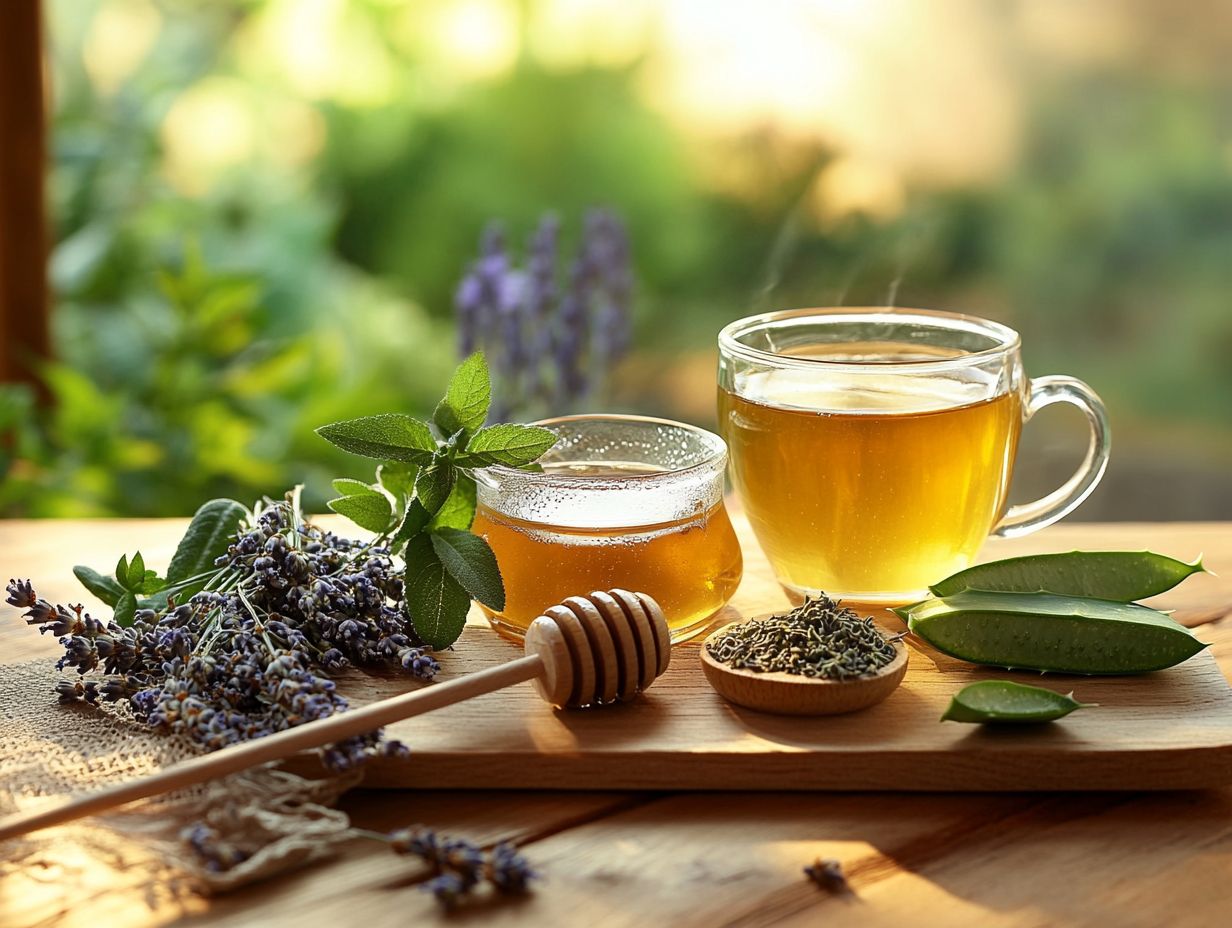
Lemon balm, tea tree oil, aloe vera, echinacea, and licorice root are effective herbal remedies for treating cold sores. These remedies can help reduce pain and inflammation, promote healing, and prevent future outbreaks. It is important to use these remedies properly and be aware of any potential side effects or precautions before using them.
1. Lemon Balm
Lemon balm, a delightful member of the mint family, is increasingly recognized for its potential in treating cold sores caused by the herpes simplex virus. It offers a natural alternative to conventional antiviral medications.
This herb has been cherished since ancient times for its soothing properties. It eases skin irritations and promotes restful sleep.
The key ingredients in lemon balm possess antiviral and anti-inflammatory effects that significantly alleviate cold sore discomfort. Research shows that applying lemon balm gel can reduce both healing time and symptom severity.
When paired with other natural remedies, like peppermint oil well-known for its cooling properties and kanuka honey, celebrated for its antibacterial qualities, lemon balm can enhance overall relief and foster quicker recovery.
2. Tea Tree Oil
Tea tree oil is renowned for its impressive antiviral properties, making it an excellent choice for managing cold sores and accelerating healing.
Using tea tree oil is simple: dilute a few drops with a carrier oil, such as coconut or jojoba oil, and gently dab it onto the affected area with a cotton swab. This technique protects your skin and reduces irritation, promoting a quicker resolution of the sore.
When compared to over-the-counter topical medications, tea tree oil offers a more holistic alternative with fewer side effects, free from synthetic ingredients.
Combining tea tree oil with aloe vera enhances its soothing effects, providing an extra layer of relief and hydration for your skin’s recovery.
3. Aloe Vera
Aloe vera is well-known for its soothing properties and stands as a formidable home remedy for cold sores, providing pain relief and healing through its moisturizing qualities.
This versatile plant comes in various forms, including gel and juice, each offering unique benefits. Aloe vera gel hydrates and alleviates discomfort when applied topically, while aloe juice can help boost your immune system from the inside out.
Many users report faster healing times and reduced pain when combining aloe with vitamins C and E, which enhance its antiviral properties. Anecdotal evidence suggests this approach can expedite recovery and help prevent future outbreaks.
In studies, participants noted significant improvement, underscoring the natural efficacy of this holistic remedy.
Act now to soothe your cold sores naturally!
4. Echinacea
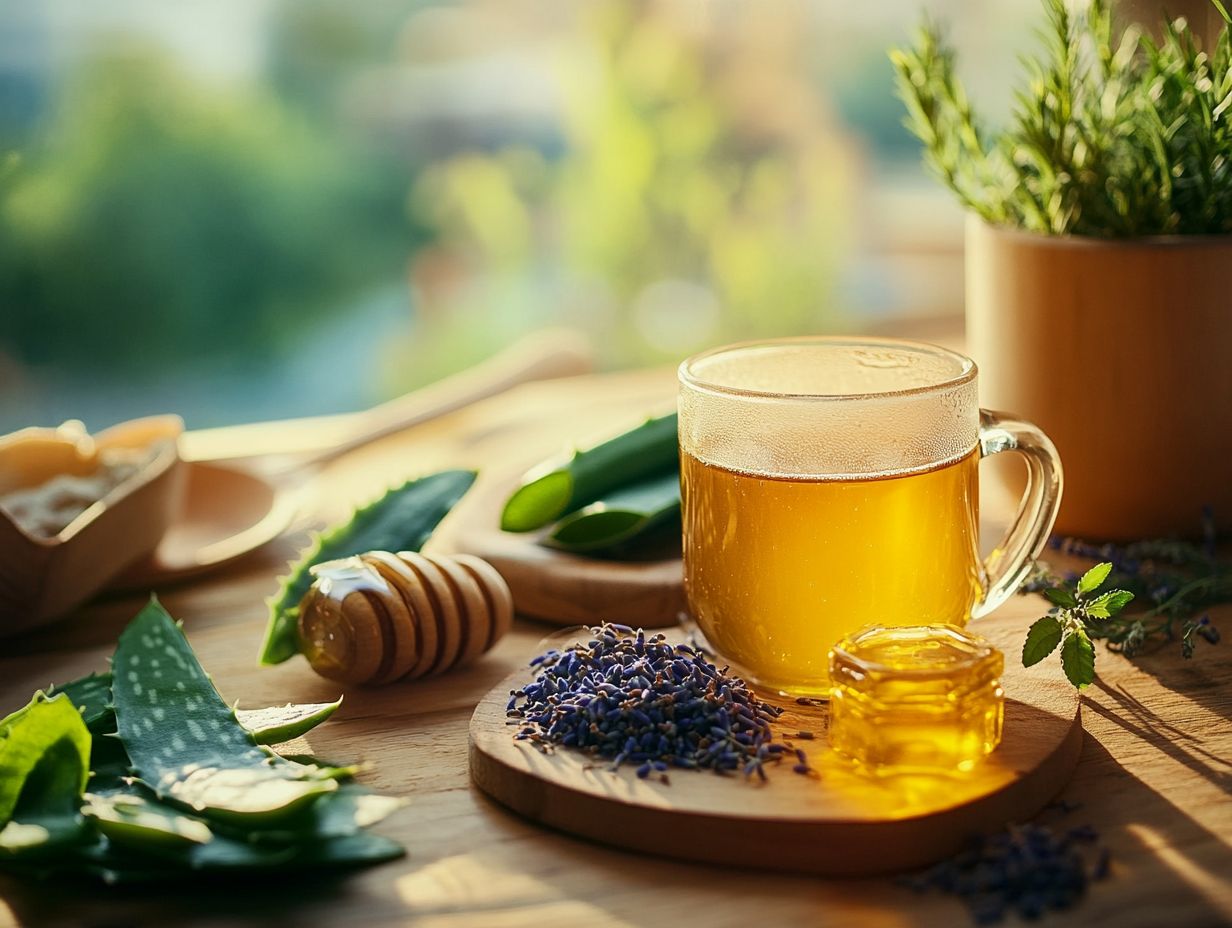
Echinacea is a well-known herbal remedy celebrated for enhancing the immune system. It may reduce both the frequency and severity of cold sores caused by herpes simplex.
This powerful plant can stimulate the production of white blood cells, which play a vital role in combating infections.
Echinacea is readily available in various forms, including teas and capsules. This allows you to select your preferred method of consumption.
If you are prone to frequent outbreaks, incorporating echinacea into your daily wellness routine can be an active way to boost your immune system.
Regularly taking echinacea helps manage symptoms and strengthen your immune system, fostering an environment conducive to recovery and overall health.
5. Licorice Root
Licorice root isn t just a beloved flavoring agent; it s also a formidable herbal remedy with remarkable antiviral properties. It offers a compelling choice for easing the discomfort of cold sores.
A key ingredient in licorice root helps stop the virus from multiplying and fine-tunes your immune response. When applied topically, it creates a calming effect on your skin, promoting healing while reducing inflammation.
Its effectiveness in tackling cold sores stands out compared to traditional antiviral medications. Licorice root uniquely interacts with viral proteins, potentially resulting in fewer side effects.
This natural remedy offers an intriguing alternative for those seeking a gentle yet powerful treatment option.
Understanding Cold Sores: Causes and Triggers
Cold sores, often known as fever blisters, are small, uncomfortable lesions that typically appear on or around your lips. They are primarily caused by the herpes simplex virus (HSV), particularly HSV type 1, and can be triggered by various factors, including stress and illness.
This viral infection spreads easily through direct contact, such as kissing or sharing utensils. After the initial outbreak, the virus tends to lie dormant in your body.
Cold sores can be a real nuisance! They start with a tingling sensation and quickly progress to painful blisters. These blisters can rupture, leading to crusting before they heal, typically taking about one to two weeks.
Environmental triggers significantly influence their recurrence. Intense stress, sunburn, and a weakened immune system can reactivate the virus, resulting in unwelcome repeat episodes.
Understanding these dynamics is crucial for effectively managing and preventing outbreaks.
How Do These Herbal Remedies Help with Cold Sores?
Herbal remedies can be a powerful ally in managing cold sores. They leverage natural antiviral properties to promote healing and alleviate discomfort through various mechanisms.
These natural treatments often contain compounds that reduce inflammation and support the skin s recovery process, offering a refined alternative to conventional therapies.
For example, plants like lemon balm and a range of essential oils can directly target the herpes simplex virus while soothing irritated skin. Their effectiveness is significantly enhanced when paired with healthy lifestyle choices.
Incorporating stress reduction techniques, such as mindfulness and yoga, can play a vital role in boosting your immune system. This creates a holistic approach that addresses both physical symptoms and the underlying triggers of outbreaks.
By being well-equipped to handle flare-ups, you can navigate them with grace and resilience.
What Are the Proper Ways to Use These Herbal Remedies?
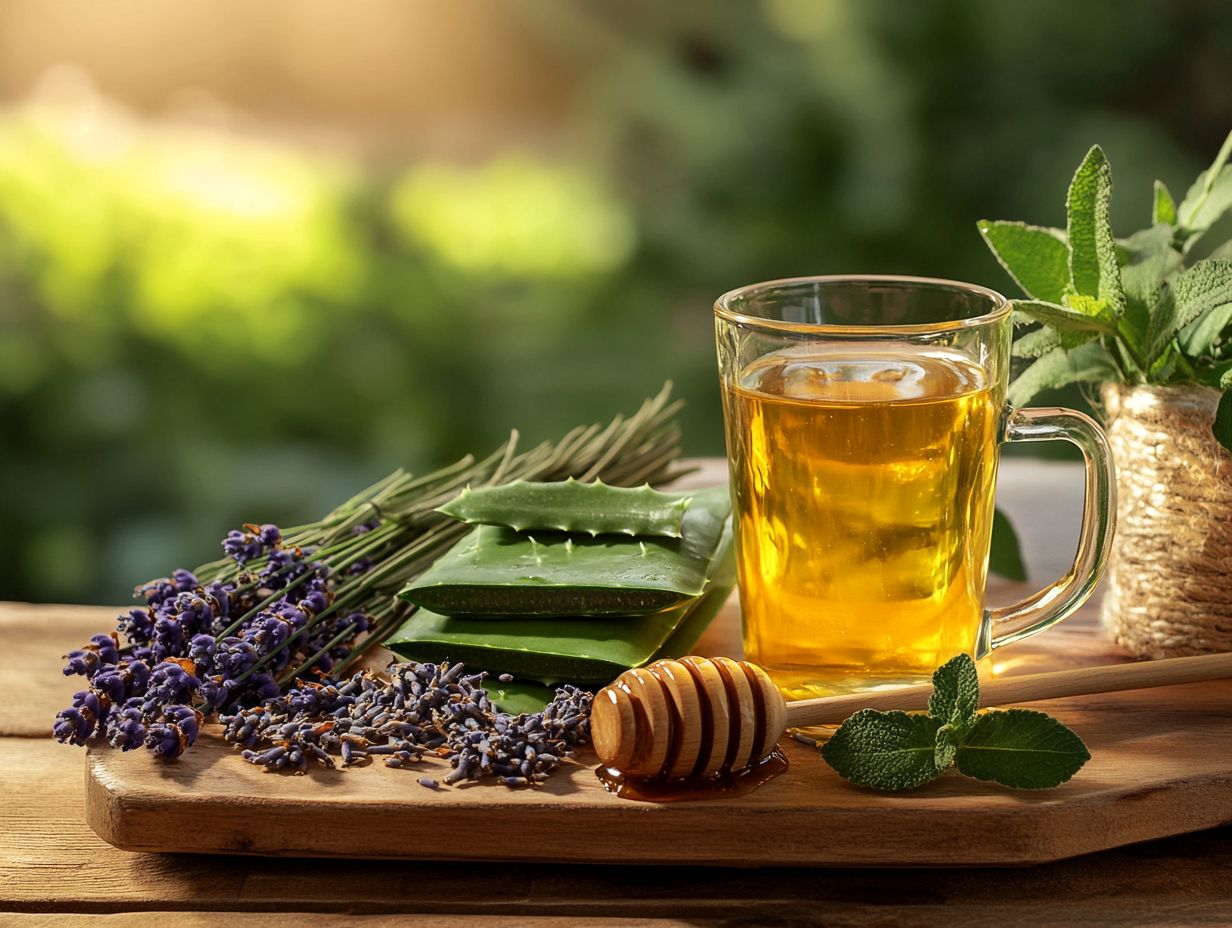
Using herbal remedies effectively for cold sores demands a keen understanding of proper application methods, dosage, and the unique benefits of each remedy to truly harness their healing potential.
Incorporating herbs like lemon balm, echinacea, and peppermint can provide significant relief. However, knowing how to use them is crucial.
For example, you can apply lemon balm as an ointment. Ensure to dilute the essential oil in a carrier oil to protect sensitive skin.
Regarding echinacea, sipping on it as tea is beneficial, with a recommended dosage of 300 mg extract three times daily.
If you plan to combine these herbal treatments with over-the-counter pain relievers, it’s wise to consult a healthcare provider to confirm compatibility and avert any potential interactions.
Alternating topical applications with herbal remedies can enhance healing, but always be mindful of how your skin reacts to these treatments.
Are There Any Side Effects or Precautions to Take When Using These Remedies?
Be cautious! While herbal remedies are generally safe, you must be aware of potential side effects and take precautions to make sure the treatment is safe and works well.
- You may encounter mild side effects like gastrointestinal discomfort.
- Headaches or skin irritations can occur when using certain herbal products.
- These remedies can interact with prescription medications or over-the-counter options, potentially amplifying effects or diminishing their effectiveness.
For instance, St. John’s Wort might reduce the efficacy of antidepressants or blood thinners. Therefore, consulting a healthcare professional is essential, particularly if you are pregnant, nursing, or have pre-existing health conditions.
This ensures you avoid adverse interactions and find a tailored approach for managing cold sores effectively.
Can These Remedies Be Used as a Preventative Measure for Cold Sores?
You ll be pleased to know that several herbal remedies can help prevent cold sores! They can potentially reduce the frequency and severity of outbreaks associated with the herpes simplex virus.
Incorporating options like lemon balm, renowned for its antiviral properties, along with licorice root, can enhance your immune system.
Embracing lifestyle changes, such as a balanced diet rich in vitamins and minerals, can further elevate your overall health.
Engaging in regular physical activity not only promotes your general well-being but also acts as a natural stress reliever crucial, given that stress is often a significant trigger for cold sore flare-ups.
Additionally, techniques like meditation or yoga can greatly enhance your emotional resilience, giving you the power to manage anxiety more effectively and minimize the likelihood of situations that could provoke an outbreak.
What Other Natural Remedies Can Help with Cold Sores?
Along with herbal remedies, you ll find a range of natural treatments that can help manage cold sores, providing alternatives or complements to traditional antiviral medications and topical treatments.
Among these options, kanuka honey really shines with its impressive antibacterial and antiviral properties, making it a favored choice for soothing outbreaks and aiding skin healing.
Then there s vitamin C, which plays a crucial role in bolstering your immune function and collagen formation, ultimately promoting faster recovery and shortening the duration of those pesky cold sore episodes.
Don t overlook the benefits of incorporating vitamin E into your routine; it’s renowned for its skin-nourishing and anti-inflammatory effects, enhancing the healing process.
By thoughtfully weaving these remedies into a comprehensive cold sore management plan, you can create a more effective strategy that highlights natural healing while still tackling the discomfort of outbreaks.
Frequently Asked Questions
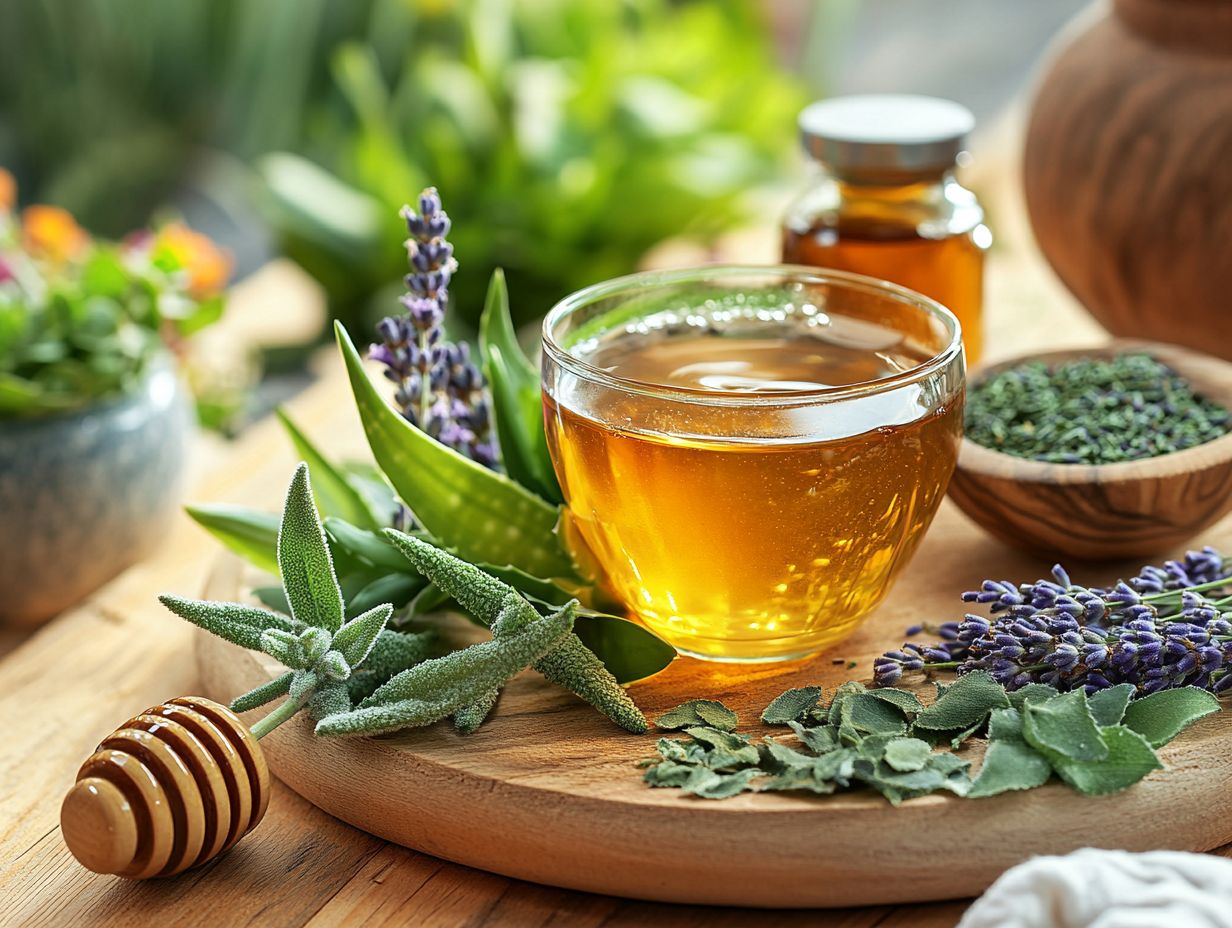
What are cold sores and how do they form?
Cold sores, also known as oral herpes, are small, fluid-filled blisters that form around the mouth and lips. They are caused by the herpes simplex virus (HSV-1) and can be triggered by factors such as stress, fatigue, or exposure to sunlight.
Try these remedies and share your experiences or questions in the comments below!
What are the 5 must-try herbal remedies for cold sores?
Here are five herbal remedies for cold sores: lemon balm, tea tree oil, licorice root, aloe vera, and peppermint oil. Additionally, considering top herbs for cold prevention can help lessen the pain and duration of cold sores.
How do I use lemon balm for cold sores?
Apply lemon balm essential oil or cream directly to the cold sore. You can also make tea from dried lemon balm leaves and use it with a cotton ball at the first sign of a cold sore.
Is tea tree oil safe to use on cold sores?
Yes, tea tree oil is safe. Just be sure to dilute it with a carrier oil like coconut or olive oil to avoid skin irritation.
Can licorice root really help with cold sores?
Absolutely! Licorice root contains glycyrrhizin, which fights the herpes simplex virus. You can apply licorice root cream directly to the sore or drink licorice root tea for benefits.
How can aloe vera help with cold sores?
Aloe vera is soothing and anti-inflammatory, which helps reduce pain and swelling. Apply aloe vera gel directly to the sore or drink aloe vera juice to strengthen your immune system.

